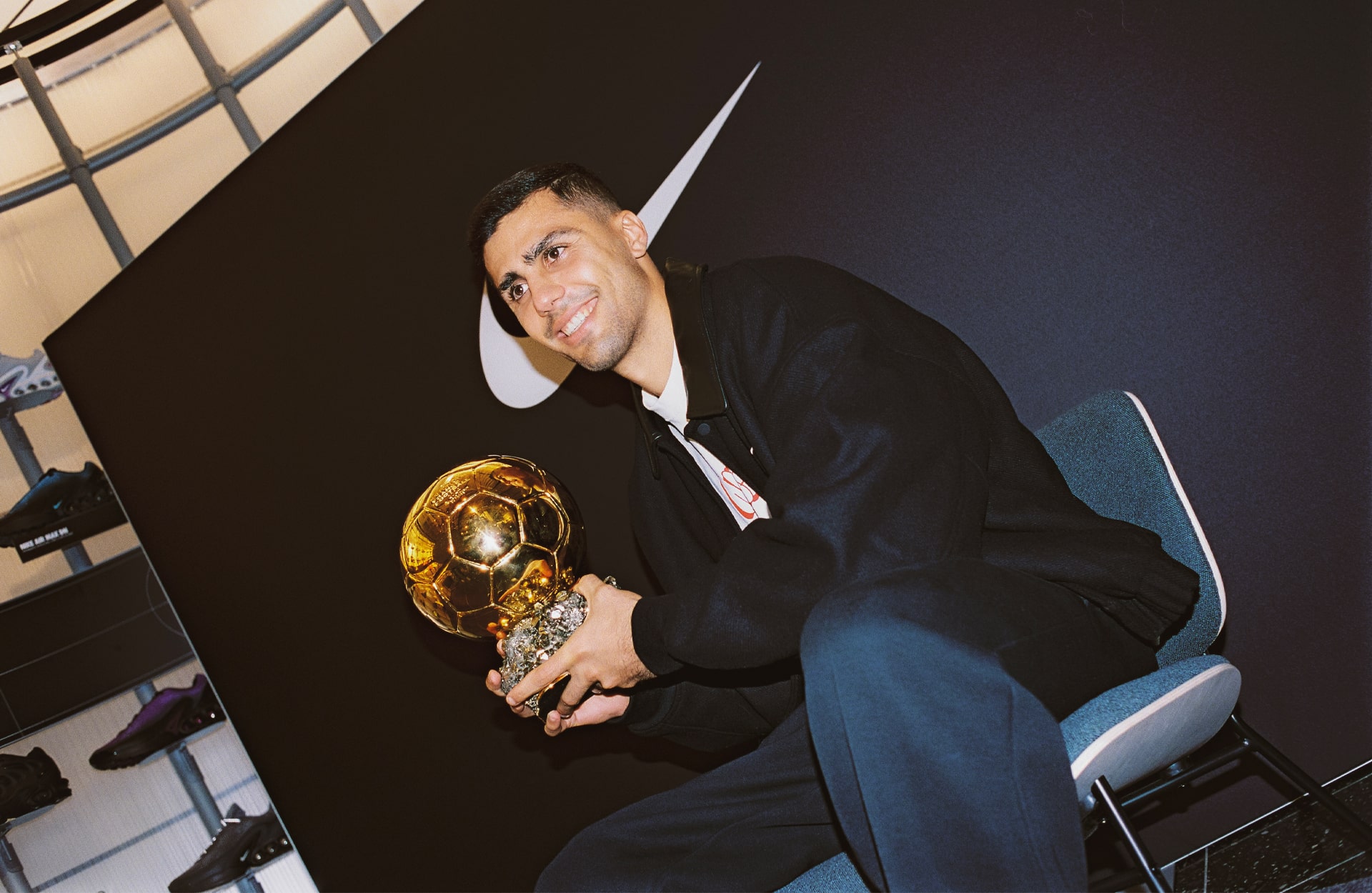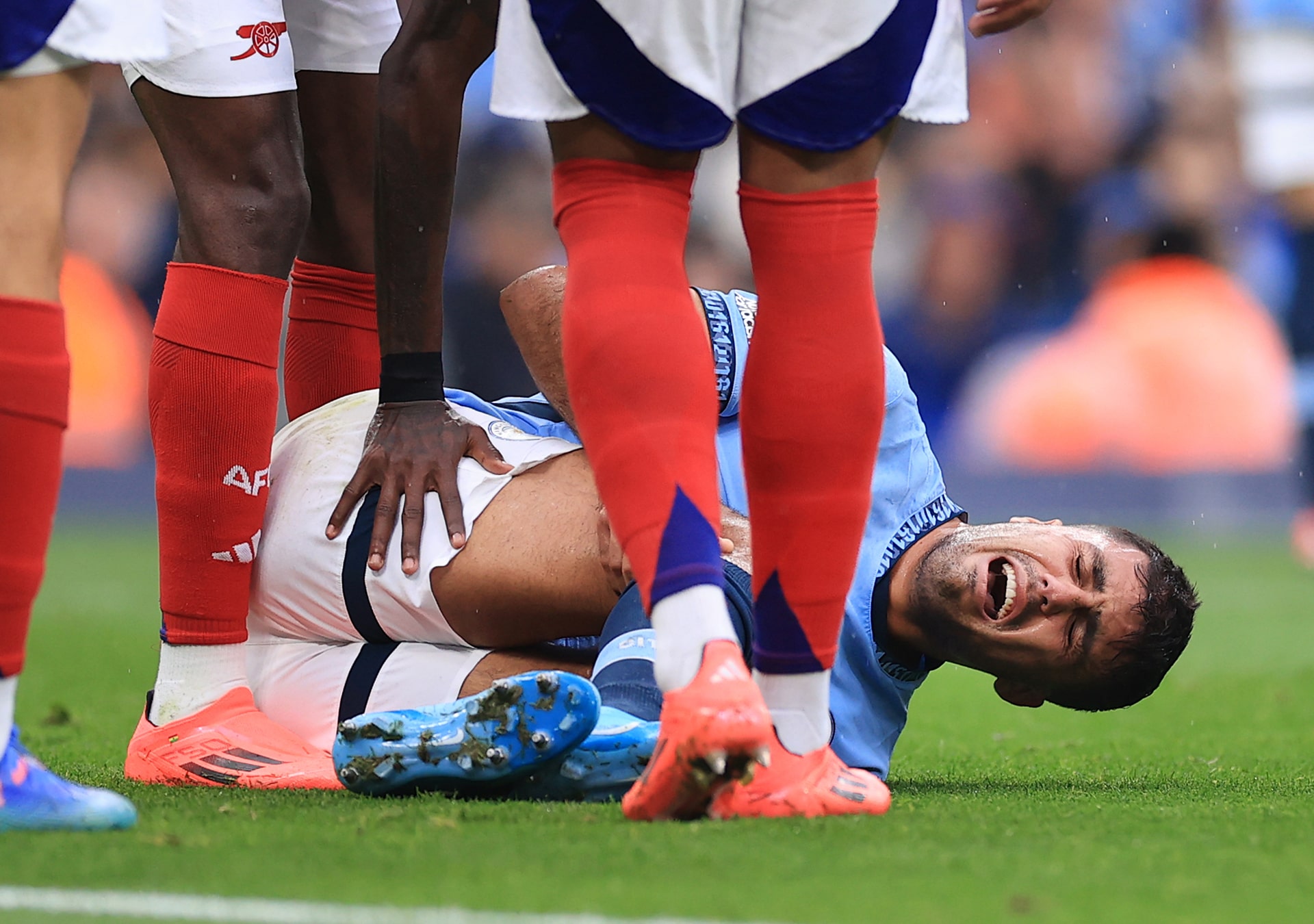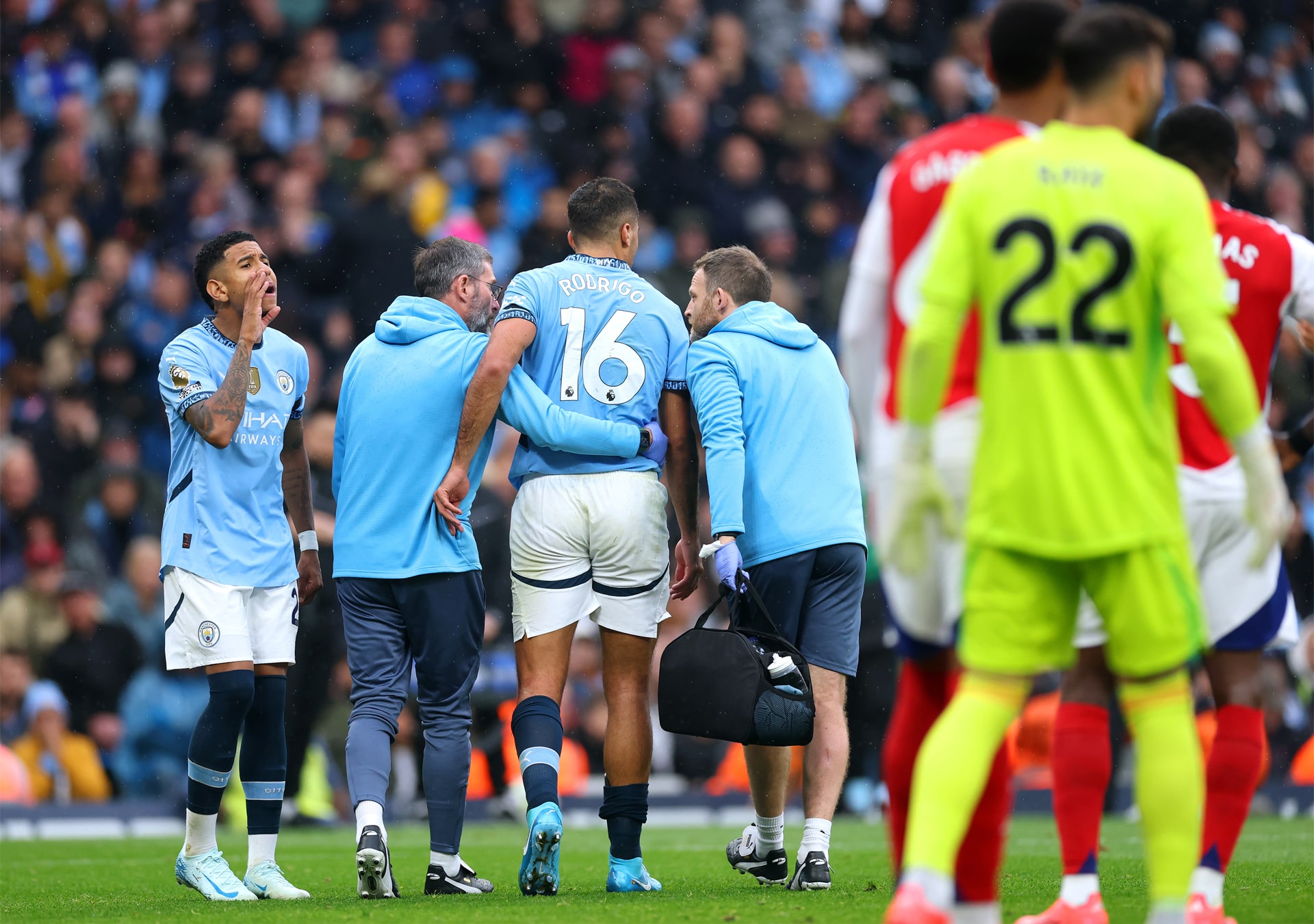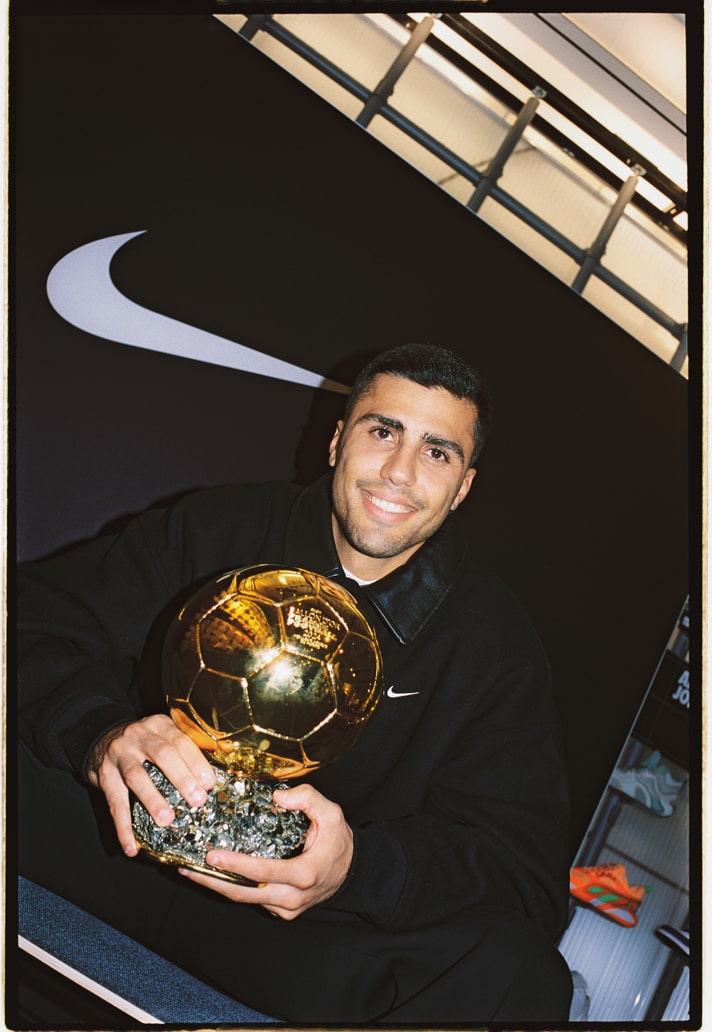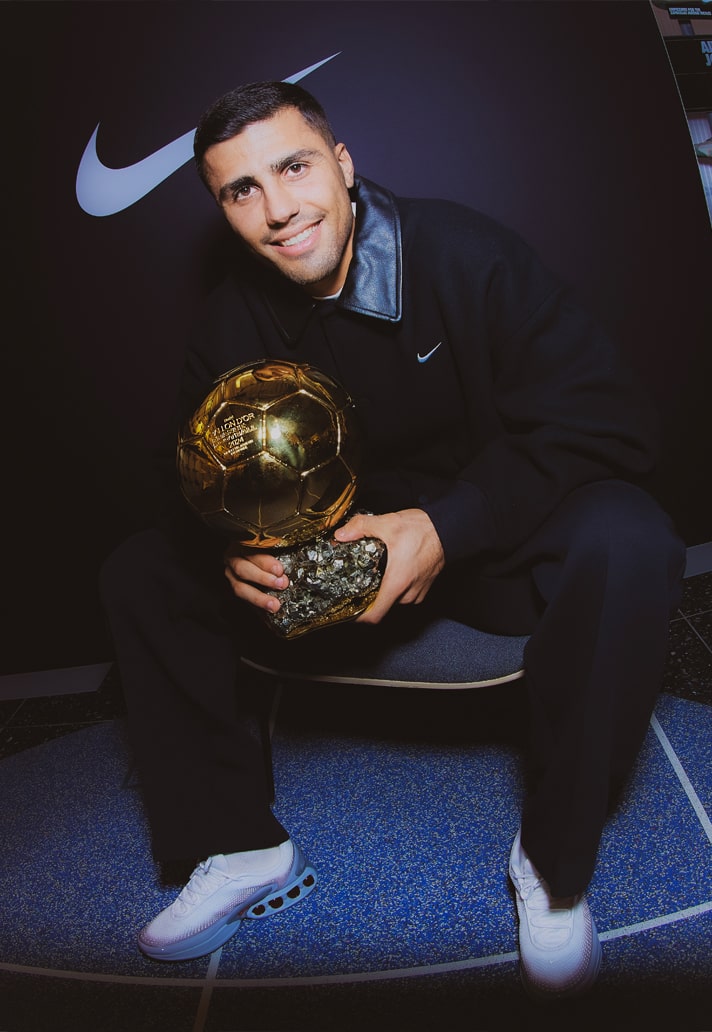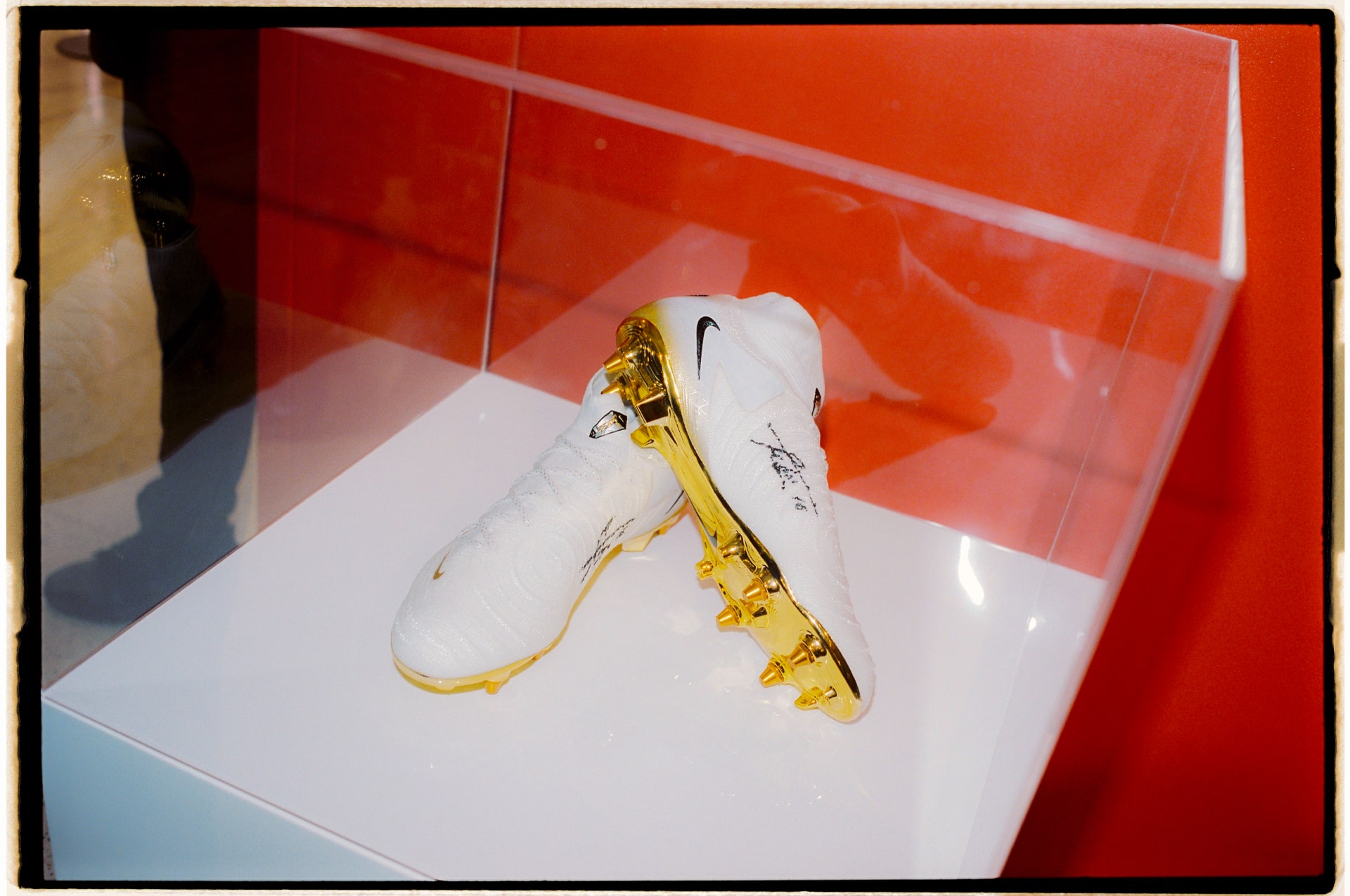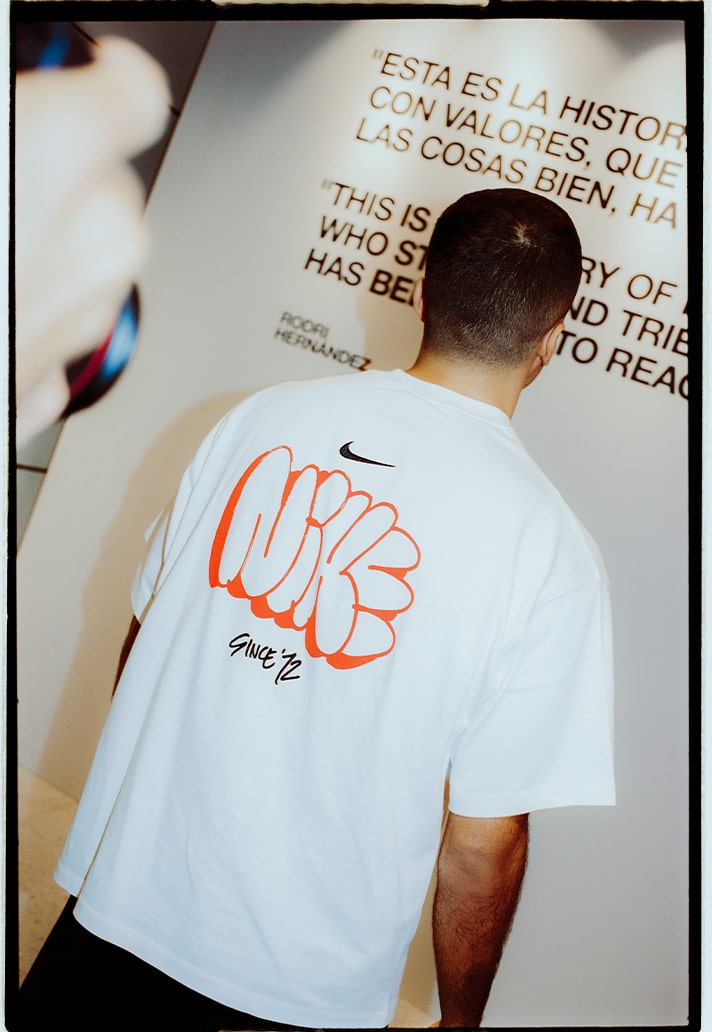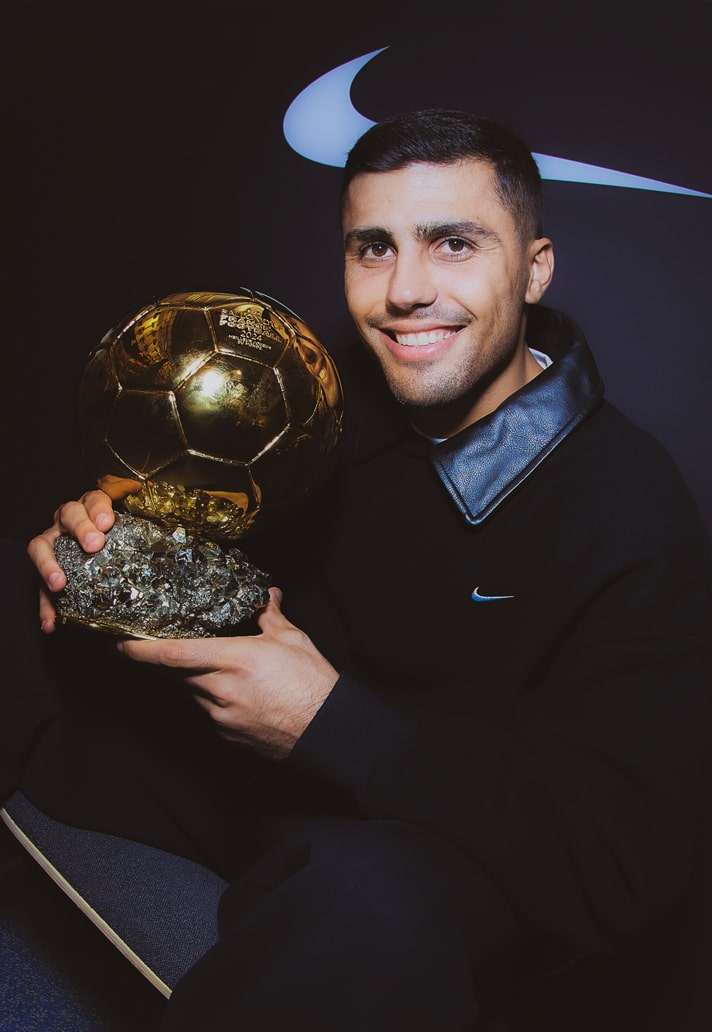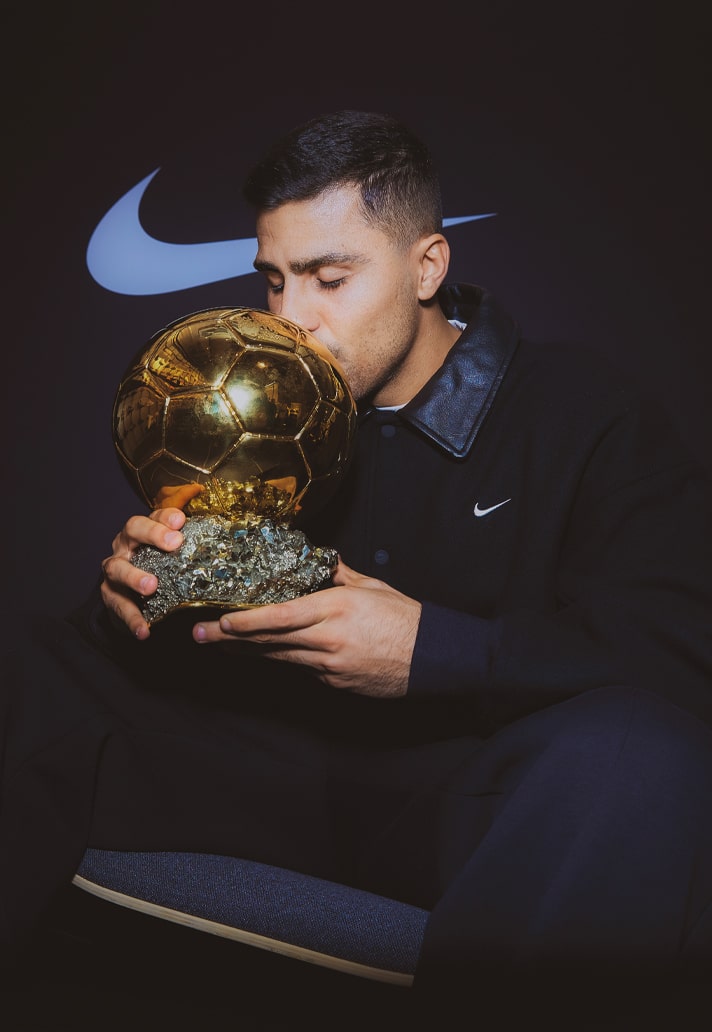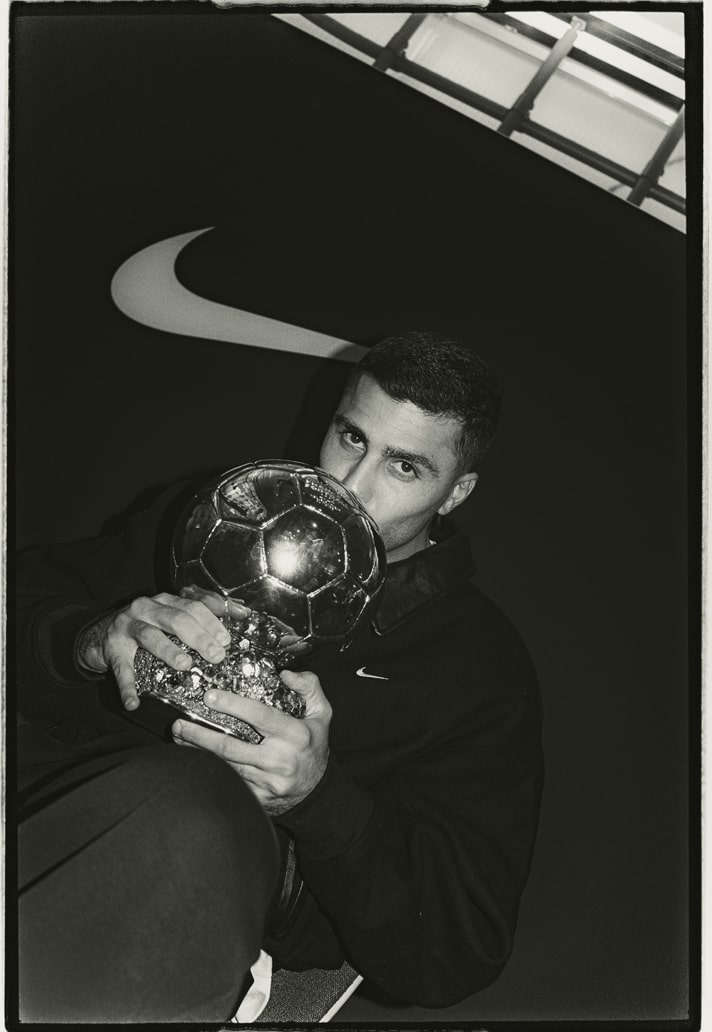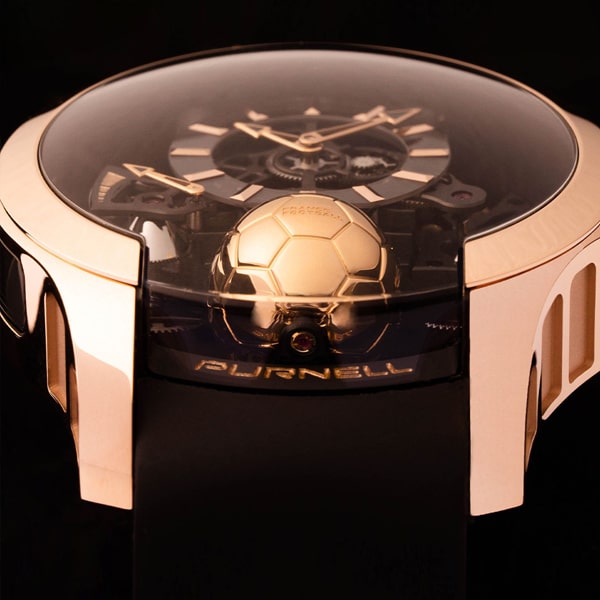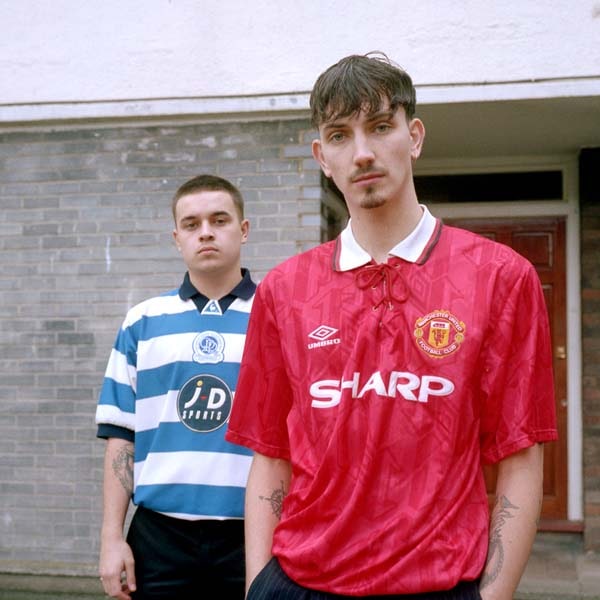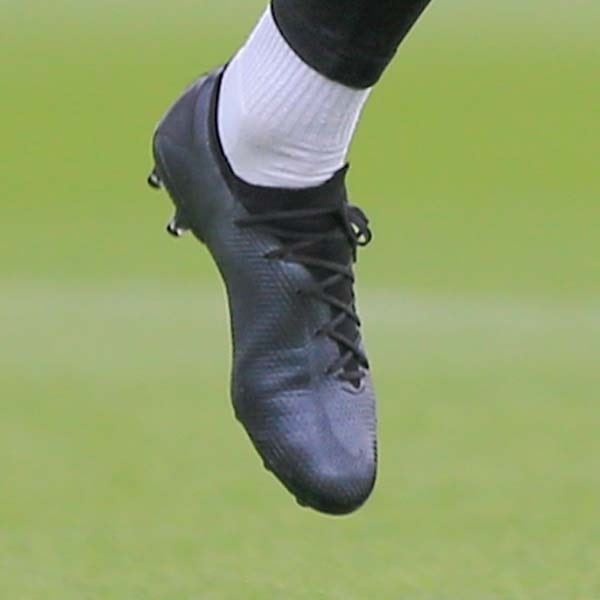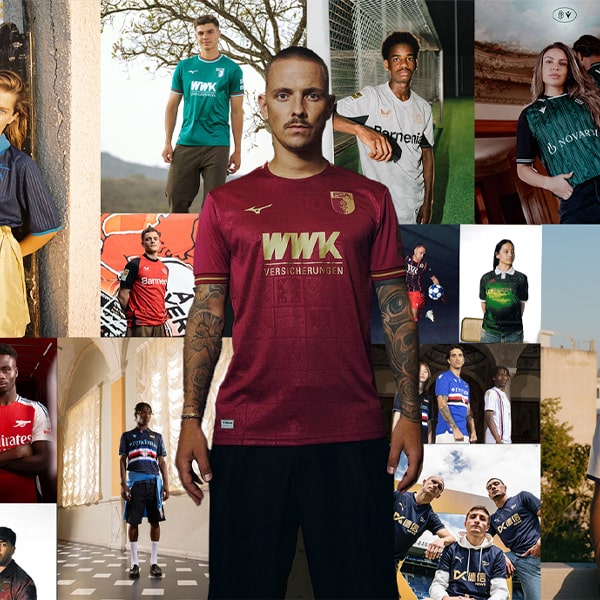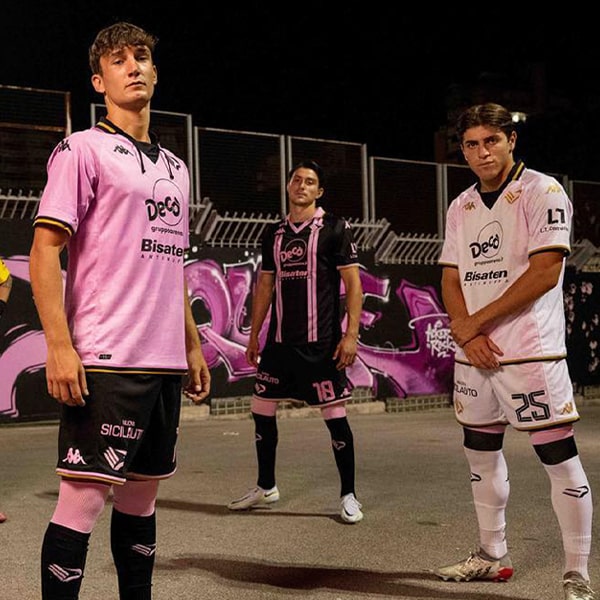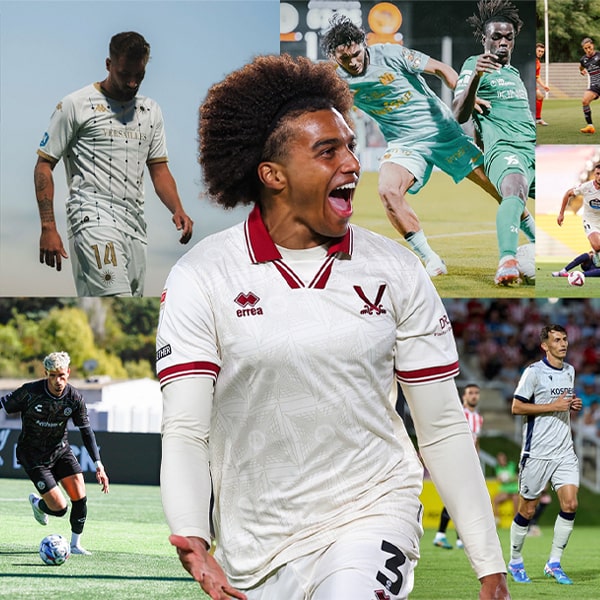From Madrid to Manchester, Rodri has never let his true self slip away in the pursuit of greatness. We caught up with this year’s Ballon d’Or winner to talk about his career to date and the lessons he’s learnt along the way.
What do you say to the best player in the world? Honestly, what do you say?
I’m in Madrid for the first time; I’ve never been to Spain; I don’t speak Spanish, and that’s all topped off with a first encounter with Rodri, the best player in the world.
We’re in the underbelly of Nike’s store in the city centre, and next to me is the Ballon d'Or—the actual trophy. It stops you in your tracks; the same goes for the two broad bodyguards standing beside it. As for Rodri, who later walks in, he’s everything his reputation would suggest: cool, calm, and courteous. In the best way, none of my nerves mattered to him. He’s an open book, welcoming me to where it all began.
Three weeks earlier, he stepped in front of the world—coronated as football’s best. In Paris, the city of love, he delivered a speech expressing a deep adoration for the game and life. He’d reached football immortality, yet made sure to reflect on what brought him there. It was a testament to him, the person—someone who has shaped him, the player.
From Villareal to valedictorian, the student of the game has used every experience life has thrown at him as a lesson. “Football is the way I understand life; it’s where I feel free," he outlines, as though his playstyle and dedication didn’t tell you. The relationship the two have shared is what, ultimately, took him to the gates of the game’s greats—he owes a lot to the happiness it has brought him. “It’s been my best friend, and like any friend, I give my all to it”.
Yet, as much as it can give, football also takes—Rodri, sadly, knows that all too well. In a year where he lifted the Premier League for a fourth consecutive time and was championed as Europe’s best both individually and collectively, he experienced an injury so frequently feared by those across the game. And, as he lay in agony at the centre of the Etihad—a stadium that has offered him so much joy—he was presented with a true test of a person’s character: recovery.
So when football, your life, is ripped away from you in an instance, how do you manage? What paves the road to recovery? For Rodri, it’s embracing the bad as much as the good—"sometimes we have to be smiley with everyone, and that’s impossible. It’s important we’re honest with ourselves and with others too; show our true personality no matter the circumstances”.
This is a reflection that extends beyond his injury. Taking on the words and experiences you’d rather not encounter and using them as a way to learn is a mindset that has moulded his career to date. “You need to improve, and the things you often don’t like to hear are what will make you better, and it’s the people who love you most who will tell you that.” As for those he looked up to, he thanks the people closest to him: “I have idols as football players, but the role models I had were my family, my father, and now so many others. My girlfriend, my agent, all of these people have taught me ways to be better”.
This is how Rodri has risen through the ranks. On a stage where many would freeze, he thrives and does so all while remaining his true self. “I just try to be myself. I think that’s the key: being me.” Many mistake him as the sacrificial cog in the system, but that would be doing him a disservice. He’s the engine, the motor, the wheel, the axle, the screw—all aspects—no matter how big or small—that drive the team forward. Every piece of his playstyle—from the incisive edge-of-the-box run to the simplicity of his scans—is a product of his personality. After all, it’s the individuals who curate the collective.
And Rodri, the individual, is the same wherever he goes. “I’m Rodri all the time. I just try to be as happy as I can and always look ahead. That’s the most important thing—having goals ahead of me.” His ability to think ahead is not just exclusive to the pitch, as demonstrated by his thoughtful engagement with topics such as education and burnout.
“Speaking out on these topics is important, not only for the current generation but future ones too. I try to teach them that there are other ways to reach things." Remaining grounded to what life asks of you has been integral to Rodri’s career, with his time studying while playing for Villareal being something his father insisted on. He’s proud of the impression he’s making on those coming up: “I’ve received messages from parents congratulating me but also thanking me for the messages I put forward. That means a lot to me."
His work with the younger generation is already well-established; it’s part of the reason why I’m here. Upstairs are a group of kids brought in to meet the man himself and learn what it takes to reach the top. Working with children is something he feels passionately about, with his post-career ambitions steering towards it. “I’d love to do my own project; be involved with and help people. He currently works closely with Football Beyond Borders, an education and social inclusion charity based in the UK. It’s always great to see footballers being involved with positive change in their own country; to do so in one you previously had no affiliation with is commendable.
Such actions are guided by a pursuit to “live life in the moment; in person, not online"—something that also informed his decision not to be on social media. “It was a very early decision. I thought that it wasn’t going to be good for me, knowing myself and who I am. I enjoy meeting and talking with people, and social media is something I haven’t felt a need to have." In many ways, this has enriched his ability to truly be himself, with a detachment from the online world providing more real and, therefore, meaningful critiques—good and bad—for him to absorb into his game. “It helped my brain to focus on other stuff, things that, in my opinion, aren’t a waste of time.”.
This has been the real key to success: ensuring he never compromises for who he is. It’s a mindset he encourages the next generation to take on: “You always have to be yourself, and that’s the only way you’ll truly pursue your dreams." While he outlines that listening is crucial to one’s development, he equally remarks that you “should not be confused by someone trying to change you." When I ask him what that boils down to, he says he “always tells them to follow their road, their instinct inside about what they want to do, and always push to the end." If the Ballon d’Or winner says trust your gut, it’s advice you should probably heed.
Which takes us to today, where Rodri stands on top of the world. When he crossed the stage, it was the culmination of every moment he’d encountered—every high, every low—every lesson to take on to become a better version of himself. Deservedly, his hard work had been rewarded, and the belief of those around him too. He takes me through what he was thinking, admitting that he hadn’t prepared anything, instead guided purely by instinct and emotion. Fitting. I want to leave the full quote for itself; it deserves the space. After all, it’s his story.
“In those moments, everything that comes out of your heart is better. You remember your family, all the people who surrounded you in the big moments of your life. That goes for everything, even the tough times when I felt like I wasn’t going to succeed. It was a chance to thank many people who helped me arrive there.”
No matter what side of the fence you sit on, what you can’t deny is that Rodri deserved this moment. He’s a hero—of his club, his country, and now the game itself. Football often leaves us unable to stop and smell the flowers, but Rodri’s scent is second to none—quite literally; being crowned the best in the world means you sort of own that title. But what I think I love most about his journey is that he’s never compromised for who he is. It’s a lesson we can all learn from. Sure, be the best; but be the best by being you.
Rodri wears Nike Phantom Luna II boots, which you can pick up at prodirectsport.com/soccer
